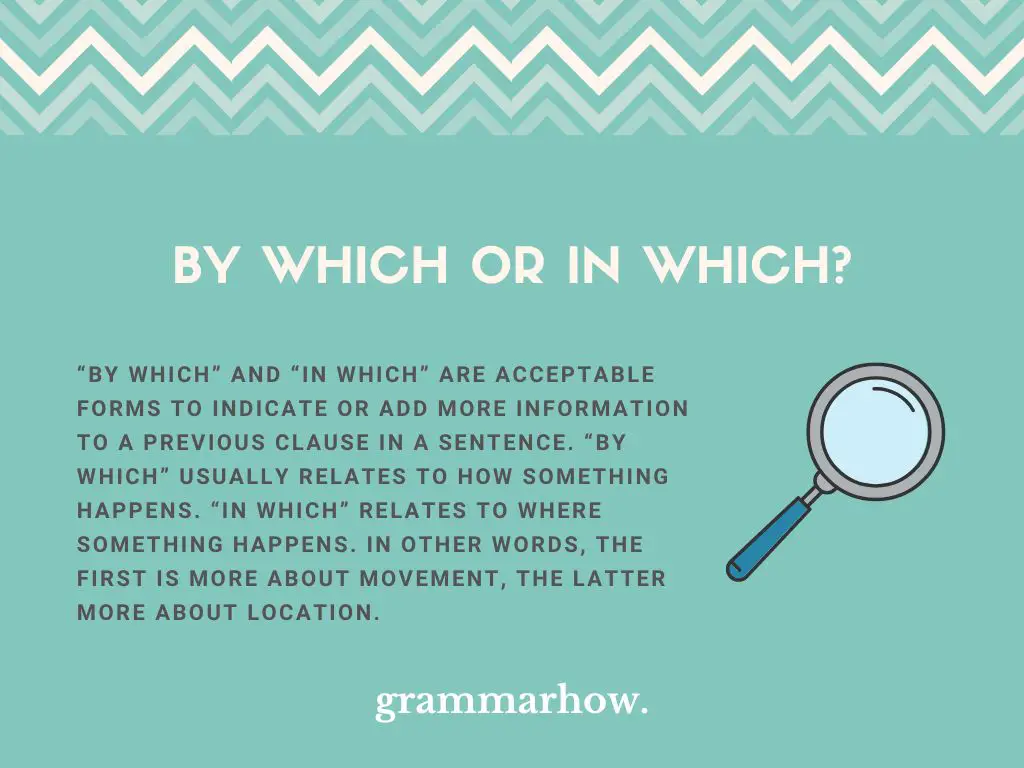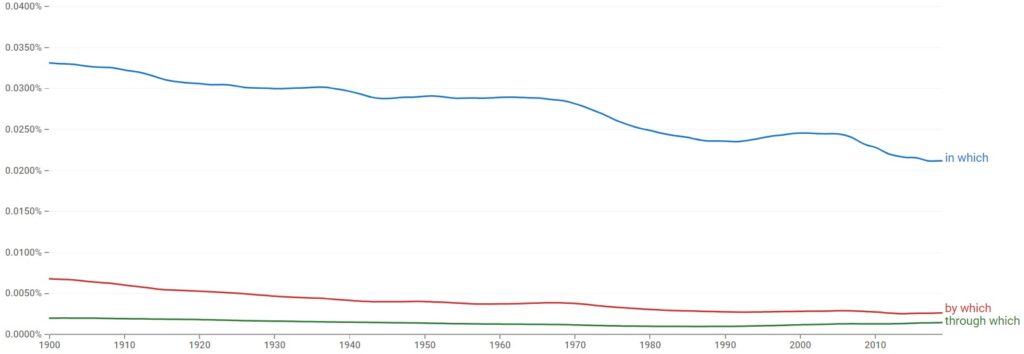Much has been said about how changing prepositions can affect the meaning of a phrase.
Think about “By Which” and “In Which”. We wonder if the change in the preposition they carry may affect the meaning of each. Also, we want to know when they should be used.
By Which or In Which?
“By Which” and “In Which” are acceptable forms to indicate or add more information to a previous clause in a sentence. “By Which” usually relates to how something happens. “In Which” relates to where something happens. In other words, the first is more about movement, the latter more about location.

Take a look at some examples below, that will help clarify this idea:
- Filtration is a process by which a liquid, such as water, is made pure.
- Filtration is a process in which a liquid, such as water, is made pure.
As you can infer from the examples, it’s possible that sometimes “In Which” and “By Which” could interchange. There is, however, a slight difference in meaning we should all take into consideration.
Think about the sentences above. When we say that filtration is a process “By Which” water is purified, we think about the water moving through the process. We visualize it going from impure to pure, from undrinkable to drinkable.
On the other hand, when we say that filtration is a process “In Which” water is purified, we visualize the process as a whole. The water is in it (as in the inside of the process) and gets purified at the end, but it’s a completely different focus.
Again, depending on the context, both forms can work and the general meaning of the sentence may still be properly conveyed. But it’s important to understand the nuances, so we can use them in our favor when the situation requires it.
By Which
“By Which” indicates how something happens or how something is done. “By” is a preposition that indicates how something is done. “Which” is a determiner to add extra information to a sentence.
The form “By Which” is a good tool to illustrate in your sentence the means or the process “Through Which” something happens or takes place.
Take a look at some examples below:
- Natural selection is the process by which new species evolve.
- There wasn’t light enough by which we could identify the man.
- Diffusion is a process by which something is spread more widely.
- Honestly, they have no standard by which to judge Carlos.
- Honestly, they have no standard in which to judge Carlos. (incorrect)
Sentences 4 and 5 show an instance in which the form “By Which” and “In Which” cannot interchange. People are judged “By” certain standards, and not “In” certain standards. Therefore, the one correct form to use here is “By Which”.
In Which
“In Which” indicates where, or in which setting, something happens or takes place. “In” is a preposition that indicates the location where something is confined, the perimeter where it can be found. By using the form “In Which”, we point out where (literally or figuratively) something happens.
Let’s go over some examples:
- Anna had a weird dream, in which she was flying over the city.
- I don’t think John is coming tomorrow, in which case we need a plan B.
- I’m writing a paper in which I must quote ten different sources.
- In which circumstances can we ask for Peter’s support?
- By which circumstances can we ask for Peter’s support? (incorrect)
Sentences 4 and 5 present us with an example where “In Which” and “By Which” aren’t interchangeable. The question is about what circumstances would be acceptable to ask for Peter’s help.
In other words, Peter’s help is confined to certain conditions. In that scenario, only “In Which” is acceptable.
Through Which
“Through Which” is a synonym for “By Which”. Both forms are correct and acceptable, you just need to choose which one you’re more comfortable with.
Take a look at the examples below:
- Natural selection is the process through which new species evolve.
- There wasn’t light enough through which we could identify the man.
- Diffusion is a process through which something is spread more widely.
- The country through which they passed was mountainous.
- Arteries are like tubes through which blood flows from the heart.
Sentences 1 to 3 are the same as the ones found in the examples for “By Which”. We only replaced “By Which” with “Through Which”, to see how both phrases work as interchangeable synonyms.
Which Is Used the Most?
Which one of those forms is used more often, “By Which”, “In Which”, or “Through Which”? Let’s find out by looking at the graph from Google Ngram Viewer below.

“In Which” is the most used form, by a considerable difference. We weren’t surprised by it, because “In Which” has broader use and is more common than the other two phrases, in our daily conversations.
“By Which” comes second but very close to “Through Which”. Keep in mind that those two forms are synonyms and have similar usage. You can use any of the two and be assured to be sending the same message.
Final Thoughts
“By Which” and “In Which” are correct forms that you can use in your sentences to add information to what was stated before. “By Which” refers to a process “Through Which” something happens. “In Which” is more about location or the limits to a certain occurrence, literally or figuratively speaking.

Martin holds a Master’s degree in Finance and International Business. He has six years of experience in professional communication with clients, executives, and colleagues. Furthermore, he has teaching experience from Aarhus University. Martin has been featured as an expert in communication and teaching on Forbes and Shopify. Read more about Martin here.
